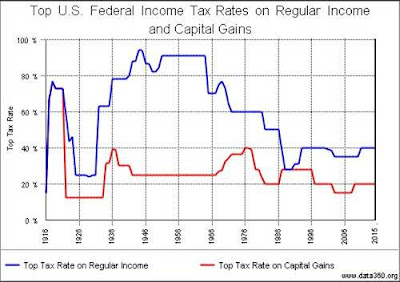not really. correlation =/= causation, and you will note they only cite select years. I could make an equally well-backed case regarding the economic effects of the length of womens' skirts.
History argues differently:
"a list of the
top reasons that historians and economists have cited as causing the Great Depression:
1. Stock Market Crash of 1929
Many believe erroneously that the stock market crash that occurred on Black Tuesday, October 29, 1929 is one and the same with the Great Depression. In fact,
it was one of the major causes that led to the Great Depression. Two months after the original crash in October, stockholders had lost more than $40 billion dollars. Even though the stock market began to regain some of its losses, by the end of 1930, it just was not enough and America truly entered what is called the Great Depression.
2. Bank Failures
Throughout the 1930s over 9,000 banks failed. Bank deposits were uninsured and thus as banks failed people simply lost their savings. Surviving banks, unsure of the economic situation and concerned for their own survival, stopped being as willing to create new loans. This exacerbated the situation leading to less and less expenditures.
3. Reduction in Purchasing Across the Board
With the stock market crash and the fears of further economic woes, individuals from all classes stopped purchasing items. This then led to a reduction in the number of items produced and thus a reduction in the workforce. As people lost their jobs, they were unable to keep up with paying for items they had bought through installment plans and their items were repossessed. More and more inventory began to accumulate. The unemployment rate rose above 25% which meant, of course, even less spending to help alleviate the economic situation.
4. American Economic Policy with Europe
As businesses began failing, the government created the Smoot-Hawley Tariff in 1930 to help protect American companies. This charged a high tax for imports thereby leading to less trade between America and foreign countries along with some economic retaliation.
5. Drought Conditions
While not a direct cause of the Great Depression, the drought that occurred in the Mississippi Valley in 1930 was of such proportions that many could not even pay their taxes or other debts and had to sell their farms for no profit to themselves. The area was nicknamed "The Dust Bowl." This was the topic of John Steinbeck's The Grapes of Wrath."
Great Depression - Top Five Causes of the Great Depression
"The Glass–Steagall Act was enacted after the Great Depression. It separated commercial banks and investment banks, in part to avoid potential conflicts of interest between the lending activities of the former and rating activities of the latter. Economist Joseph Stiglitz criticized the repeal of the Act. He called its repeal the "culmination of a $300 million lobbying effort by the banking and financial services industries...spearheaded in Congress by Senator Phil Gramm." He believes it contributed to this crisis because the risk-taking culture of investment banking dominated the more conservative commercial banking culture, leading to increased levels of risk-taking and leverage during the boom period.[8]
Economists Robert Kuttner and Paul Krugman have criticized the repeal of the Glass–Steagall Act by the Gramm-Leach-Bliley Act of 1999 as possibly contributing to the subprime meltdown, although other economists disagree."
Financial Derivative Regulation / Commodity Futures Modernization Act of 2000
"The Commodity Futures Modernization Act of 2000 exempted derivatives from regulation, supervision, trading on established exchanges, and capital reserve requirements for major participants. Concerns that counterparties to derivative deals would be unable to pay their obligations caused pervasive uncertainty during the crisis. Particularly relevant to the crisis are credit default swaps (CDS), a derivative in which Party A pays Party B what is essentially an insurance premium, in exchange for payment should Party C default on its obligations. Warren Buffett famously referred to derivatives as "financial weapons of mass destruction" in early 2003"
"Credit default swaps are the rocket fuel that turned the subprime mortgage fire into a conflagration. They were the major cause of AIG’s – and by extension the banks’ – problems...In sum, if you offer a guarantee – no matter whether you call it a banking deposit, an insurance policy, or a bet – regulation should ensure you have the capital to deliver." He also wrote that banks bought CDS to enable them to reduce the amount of capital they were required to hold against investments, thereby avoiding capital regulations.[34] U.S. Treasury Secretary Timothy Geithner has proposed a framework for legislation to regulate derivatives.["
http://en.wikipedia.org/wiki/Government_policies_and_the_subprime_mortgage_crisis
